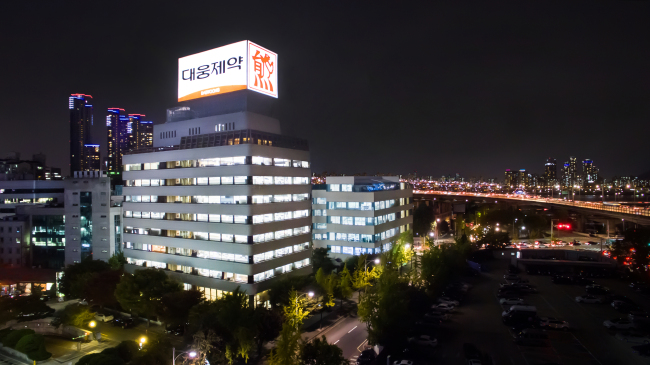Pharma firms go all-out in increasing R&D capacities
By Lim Jeong-yeoPublished : March 7, 2019 - 15:16
South Korean firms Daewoong Pharmaceutical and Celltrion Pharm are injecting funds to increase the capacity of their research and development facilities and production plants, despite some concerns that the hefty investments could weigh down their operations.
Daewoong, the latest member to join the club of pharma firms with 1 trillion won ($887 million) annual sales, said that it would invest 70.5 billion won from May 31 this year to July 31, 2023, to build a connected collaboration and development center in Magok in Gayang-dong, Seoul. The C&D center will be used for research and development of potential drugs.
The 8,800-square-meter plot for the center was purchased for 29.2 billion won, meaning that effectively, some 100 billion won is going into the new facility.

The new center is expected to augment Daewoong’s efforts in various research the firm is carrying out such as in stem cells, immuno vaccines and artificial intelligence.
Due to the characteristics of the pharma industry, where long-term investments are necessary for novel drug development, Daewoong said it will not shy from aggressive research for profitability. The company is injecting over 10 percent of its earnings for R&D to develop novel drugs.
The firm announced on Wednesday that it recorded 1.3 trillion won in sales last year, up 7.4 percent from the year before.
Daewoong credited the enhanced sales performance of both ethical drugs and over-the-counter drugs to the growth. Its ethical drug sales, including that of its wrinkle-removing botulinum toxin Nabota, marked a 12.3 percent on-year rise to 674 billion won, while OTC drugs rose 10.8 percent to 92.2 billion won thanks to the growth of representative products such as liver tonic Ursa and vitamin B supplement Impactamin.
Its operating profit, however, declined 36.9 percent to 24.6 billion won with a net loss of 5.3 billion won.
The fall in operating profit was due to the firm’s Osong and Hyangnam plants’ depreciation and personnel costs, the company said.
Other than Daewoong, Celltrion Pharm, a subsidiary of biosimilar pharma firm Celltrion, is also fueling its production capacity.

Celltrion Pharm will inject 58.2 billion won to increase its capacity to produce Remsima SC, Celltrion’s new subcutaneous version of Remsima, at its plant in Ochang, Cheongju in Gyeonggi Province.
Remsima SC is a self-injectable version of Celltrion’s biosimilar copy of Johnson & Johnson’s autoimmune disease treatment Remicade (infliximab). Celltrion touts the drug as a blockbuster product.
At the start of this year, Celltrion CEO Suh Jung-jin had announced at the 20-year-old company’s first official press conference that Remsima SC will be directly sold by subsidiary firm Celltrion Healthcare.
To sell a product, it would first have to be made. Industry watchers are closely following how Celltrion Pharm will secure the funds necessary for the plant.
It currently has less than 200 million won in cashable assets, with a sizable long-term debt-to-equity ratio that experts estimate could grow from 61 percent in 2017 to 90 percent last year. The final earning report is yet to be released. The company has 27.5 billion won outstanding debt to pay back to Korea Development Bank and 10.3 billion won to NongHyup Bank, as of the third quarter last year.
Celltrion Pharm is run by Seo Jung-soo, brother of Celltrion CEO Suh Jung-jin.
By Lim Jeogn-yeo (kaylalim@heraldcorp.com)



















